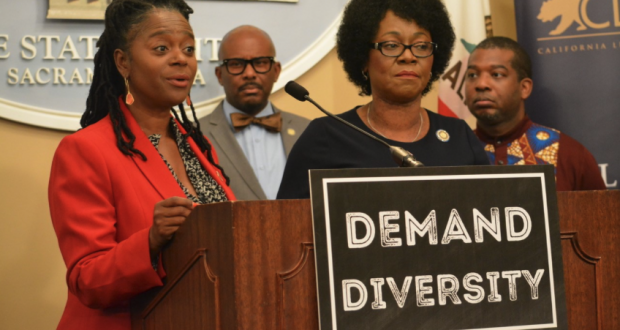By Antonio Ray Harvey | California Black Media
Assemblymember Mike Gipson (D-Carson), a member of the California Legislative Black Caucus (CLBC) says he supports Gov. Gavin Newsom’s proposal to expand the state’s Film and Television Tax Credit Program from its current $330 million annual budget allocation to $750 million.
Gipson, who is chair of the Assembly Committee on Arts, Entertainment, Sports, and Tourism, says, historically, that tax credit has aimed to increase diversity, equity, and inclusion” as outlined in SB 132.
He’s counting on it to continue making diversity a priority.
“The Legislature finds and declares an overall trend toward increasing diversity based on existing research on diversity in the motion picture production and television industry,” the bill language states.
In a statement, Gipson told California Black Media (CBM) the tax credit, “would allow our state to be more competitive against states with tax incentive programs of their own, such as Georgia, New York, and New Mexico.”
“The film and television industry is iconic to California, impacting thousands of jobs for below-the-line workers on film and television crews, as well as many others working in hair and make-up, food services and transportation, costume and set design, and more,” Gipson continued.
According to the Governor’s office, the increase would uplift the state for capped film incentive programs, surpassing other states. Gipson says he agrees with Newsom’s assessment and the notion that the program would bring more business back to California.
“California is the entertainment capital of the world, rooted in decades of creativity, innovation, and unparalleled talent,” said Newsom on Oct 27 in L.A. at the unveiling of the tax credit.
“Expanding this program will help keep production here at home, generate thousands of good-paying jobs, and strengthen the vital link between our communities and the state’s iconic film and TV industry,” the Governor continued.
As chair, Gipson’s oversees programs and policies affecting the recording, motion picture, and other entertainment industries, tourism and arts programs, and museums. His purview also extends to professional and amateur sports, including the State Athletic Commission and the regulation of athlete agents.
California’s Film and Television Tax Credit Program has generated over $26 billion in economic activity and supported more than 197,000 cast and crew jobs across the state since it was created in 2009, according to Newsom’s office.
The California Film and Television Tax Credit 2.0, enacted in July 2015, has generated over $26 billion in economic activity and supported more than 197,000 cast and crew jobs across the state.
Now, for the first time in 15 years, tax credits will become refundable, beginning with “Program 4.0” set to get underway on July 1, 2025. According to the Newsom Administration, between 2020 and 2024, data reveals that California experienced lower production spending due to limited tax credit funding and increased competition in other states and countries. This dip in production directly impacted California’s labor market and local economies.
Los Angeles Mayor Karen Bass says she supports the proposal because California is the entertainment capital of the world and supporting a thriving film and television industry is key to the state’s economy.
Bass said she was Speaker of the Assembly when the tax credit program was first approved.
“I worked to support leaders like now-Councilman Paul Krekorian to create the film tax credit,” Bass said. “Despite the economy being in a difficult spot, we knew that the industry needed support, and if we could at least start the program, then we could grow it.”
Newsom’s tax credit proposal is expected to appear as a bill during the next legislative session, raising concerns about diversity, equity, and inclusion for some lawmakers and advocates.
Gipson’s CLBC colleagues Sen. Lola Smallwood-Cuevas (D-Los Angeles) and Assemblymember Tina McKinnor (D-Inglewood) led a faction of legislators who demanded answers from Hollywood last year after several Black women left high-profile executive positions in Hollywood.
A number of those Black executives who left those prominent roles were leading DEI initiatives at major entertainment companies such as Netflix, Disney, British Broadcasting Company, Warner Bros., and the Academy of Motion Pictures Arts and Sciences.
Before the tax credit program was scheduled to sunset on June 30, 2025, on July 10, 2023, Newsom signed Senate Bill (SB) 132 to extend the state’s $1.65 billion or $330 million annually Film and TV Tax Credit Program for an additional five years through fiscal 2030-31.
Speaking on behalf of Black, Indigenous, and People of Color (BIPOC) employed in the industry, McKinnor and Smallwood Cuevas insist on holding television and film studio executives accountable as they benefit from taxpayer support but often appear reluctant to support Diversity, Equity and Inclusion initiatives.
“I was highly offended to see the industry’s response to a $1.6 billion tax subsidy?by quietly eliminating Black women from executive positions with a number of studios,” said McKinnor. “Many of these women were involved in their studios’ diversity, equity, and inclusion efforts, which raises a serious question about their commitment to diversity, equity, and inclusion in the film industry.”
The legislation for this year’s tax credit program has not been written, but Gipson’s staff has indicated that he will not introduce it – even though the issue is close to his heart.
“The impacts of the entertainment industry go beyond movie theaters and television screens, with movies and shows drawing tourists to California from all around the world,” Gipson stated. “I applaud the work being done by the California Film Commission, the studios, and the entertainment unions, and I look forward to supporting this proposal next year as it moves through the legislative process.”
 Westside Story Newspaper – Online The News of The Empire – Sharing the Quest for Excellence
Westside Story Newspaper – Online The News of The Empire – Sharing the Quest for Excellence





